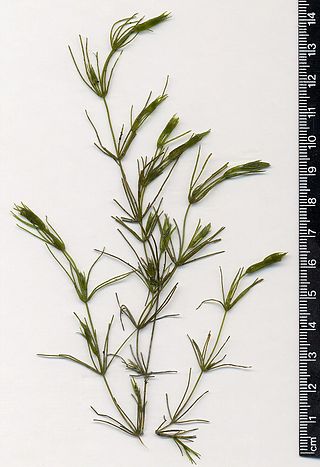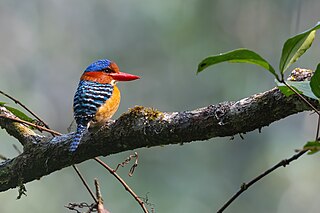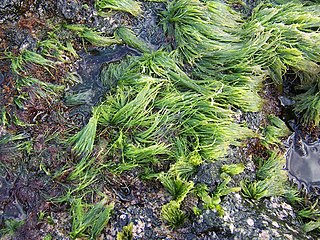
The glaucophytes, also known as glaucocystophytes or glaucocystids, are a small group of unicellular algae found in freshwater and moist terrestrial environments, less common today than they were during the Proterozoic. The stated number of species in the group varies from about 14 to 26. Together with the red algae (Rhodophyta) and the green algae plus land plants, they form the Archaeplastida.

Charales is an order of freshwater green algae in the division Charophyta, class Charophyceae, commonly known as stoneworts. Depending on the treatment of the genus Nitellopsis, living (extant) species are placed into either one family (Characeae) or two. Further families are used for fossil members of the order. Linnaeus established the genus Chara in 1753.

Navicula is a genus of boat-shaped diatom algae, comprising over 1,200 species. Navicula is Latin for "small ship", and also a term in English for a boat-shaped incense-holder.

AlgaeBase is a global species database of information on all groups of algae, both marine and freshwater, as well as sea-grass.

The banded kingfisher is a tree kingfisher found in lowland tropical forests of southeast Asia. It is the only member of the genus Lacedo. Male and female adults are very different in plumage. The male has a bright blue crown with black and blue banding on the back. The female has rufous and black banding on the head and upperparts.
Bryopsidella is a genus of green algae in the family Bryopsidaceae.

Chaetomorpha is a genus of green algae in the family Cladophoraceae. Members of this genus may be referred to by the common name sea emerald.
Pseudochlorella signiensis is a species of green algae in the family Koliellaceae. Pabia signiensis, the only species in the genus Pabia, is regarded as a synonym. Pabia was sunk into Pseudochlorella in 2016.

Chlorokybus is a multicellular (sarcinoid) genus of basal green algae or charophyte. It has been classified as the sole member of the family Chlorokybaceae, which is the sole member of the order Chlorokybales, in turn the sole member of the class Chlorokybophyceae. It grows on soil and rock surfaces, and is rare.
Mesostigma is a genus of unicellular biflagellate freshwater green algae, with a single species Mesostigma viride, covered by an outer layer of basket‐like scales instead of a cell wall. As of February 2022, AlgaeBase classified it as the only genus in the family Mesostigmataceae, the only family in the order Mesostigmatales, the only order in the class Mesostigmatophyceae. It is now considered to be one of the earliest diverging members of green plants/algae (Viridiplantae).
Pyrenomonas is a genus of cryptomonad.

Nitella is a genus of charophyte green algae in the family Characeae.

Jania is a genus of red macroalgae with hard, calcareous, branching skeletons in the family Corallinaceae.
Kiitoksia is a genus of aquatic protist. The taxonomic position of the genus is still uncertain and it has not found a robust location in any subgroup.

Elephantomyia (Elephantomyia) pulchella is an extinct species of crane fly in the family Limoniidae. The species is solely known from the Middle Eocene Baltic amber deposits in the Baltic Sea region of Europe. The species is one of six described from Baltic amber.

Phyllophora is a genus of red algae in the family Phyllophoraceae.

Mastocarpus papillatus, sometimes called Turkish washcloth, black tar spot, or grapestone is a species of red algae in the family Phyllophoraceae. It is sometimes confused with the distantly related Turkish towel which is of a similar texture but larger. The specific epithet papillatus is due to the nipple-like projections on the female gametophyte which can give the texture of a terrycloth washcloth found at a Turkish bath.











